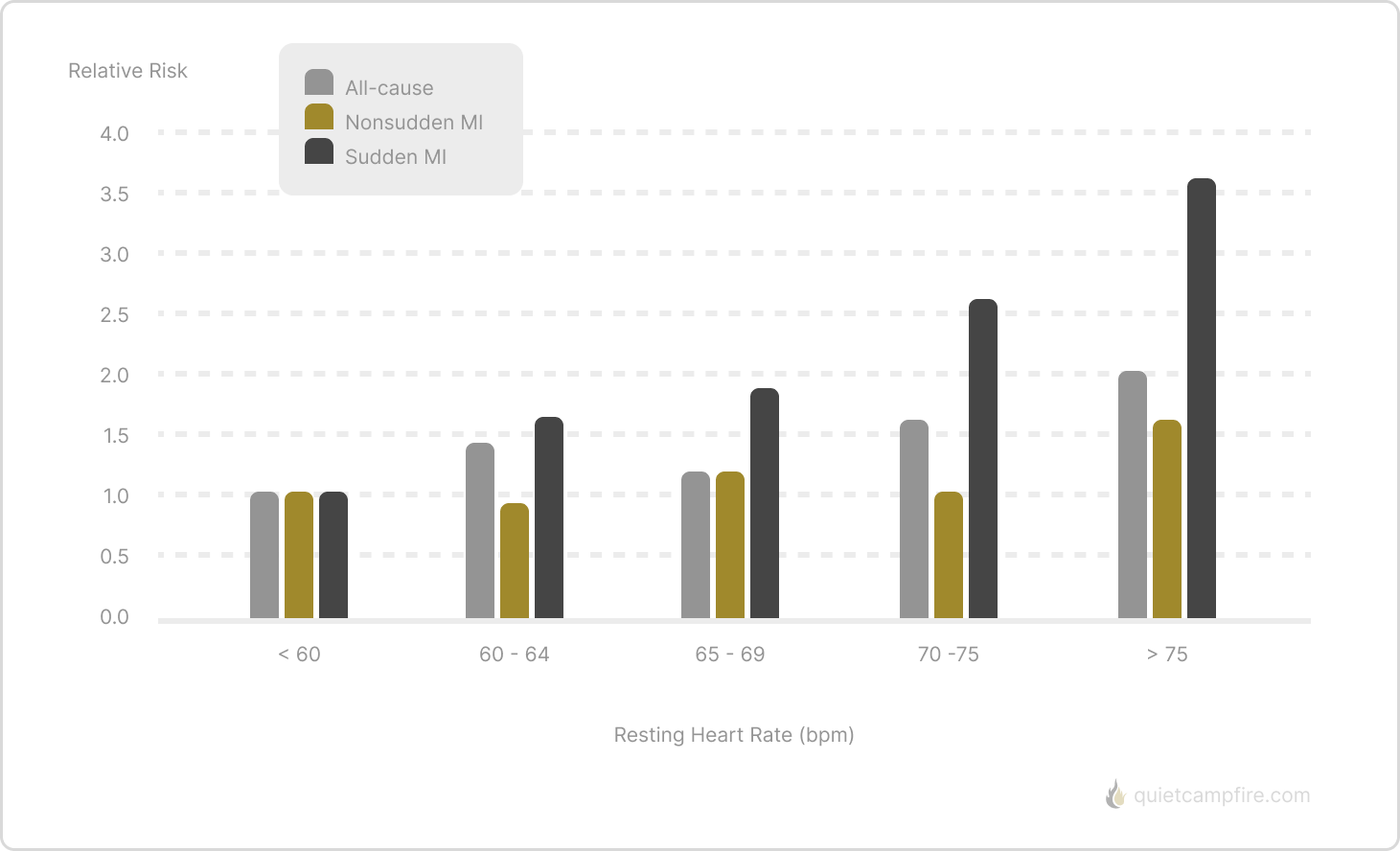
Something’s been on my mind lately. I’ve been pondering how our heart rate links with our life expectancy.
I got curious about this connection already many years ago. Mainly because I’d noticed how it feels in my own body when my heart rate is up for a while. Well, it doesn’t feel that great. It’s almost like your body is saying, “Hey, this isn’t right. Slow down! Now!”
Do you know those animal documentaries? You see a lion chilling in the sun, looking as relaxed as can be?

That’s when it hit me – it makes perfect “biological” sense to calm down and relax as often as possible, to also give our hearts a break. I mean, we’re not that different from animals, right? So if it’s good for them, it’s got to be good for us too!
So, I started digging into this, wanting to learn more.
I came across a central paper from 2015[1] that delves into this subject. In this blog post, I’ll summarize what I learned from this paper and from some additional research. We’ll explore together the relationship between our resting heart rate and how long we live.
TL;DR
Scientific studies have shown that high resting heart rates are directly associated with mortality. Things are more complex than just looking at the heart rate – but from what I understand based on the scanned research data, there is an obvious correlation. Read on …
Understanding Heart Rate
What is a heart rate, exactly? Well, think of your heart as a drummer in a band. Its beat is what we call the heart rate. It’s basically the number of times your heart beats per minute. Pretty simple.
Now, our heart rate is sometimes different. It changes based on what we’re doing and how we’re feeling. For example, you certainly have noticed your heart pounding when you’re excited or nervous. That’s your heart rate going up. And when you’re chilling out, reading a book, or taking a nap, your heart rate slows down.
RESTING HEART RATE
Your resting heart rate is just how fast your heart beats when you’re calm and not moving around much, like when you’re sitting down or sleeping. It’s your heart’s relaxed, slow pace.
So, a bunch of things can affect our heart rate: our genes, the amount of stress we’re dealing with (like oxidative stress, which is “the technical term” of saying damage caused by harmful molecules in our bodies), any organ damage we might have, how old we are, and even our body’s energy needs.
So, our heart rate isn’t just a number. It’s a reflection of what’s happening inside our bodies. And just like we keep an eye on the speedometer when driving, it’s a good idea to keep an eye on what our heart rate is doing to stay in the healthy lane.
Impact of a Fast Heart Rate
Now that we’ve got a handle on heart rate, let’s dive into why it matters. Especially when it’s on the fast side.
Imagine you’re driving a car, pedal to the metal, engine roaring, going way over the speed limit. It’s thrilling, sure, but we all know it’s not great for the car, right? It’s putting substantial stress on the engine and burning through fuel like there’s no tomorrow. The same thing happens with our hearts when our heart rate is too fast for too long.
When our heart beats super fast, it’s like it’s working overtime.

It’s doing extra work, using up more of the oxygen it gets, and all that speed puts extra pressure on the walls of our arteries, making them stiffer over time. Stiff arteries can also cause blood to move too quickly through the body, potentially damaging organs like the kidneys and brain 🧠
Overall, it’s like driving at top speed on a bumpy road – not exactly a smooth ride for our hearts. In fact, from my experience, it feels really shitty and uncomfortable.
And just like how a car can wear out faster when it’s always driven at top speed, our hearts can also face some serious issues if our heart rate is constantly high. It’s about more than feeling out of breath or exhausted. It’s about the long-term health of our hearts 🩵
So, it seems pretty intuitive: a fast heart rate over a long time isn’t the best for our bodies.
Benefits of a Lower Heart Rate
What about a slower heart rate? Is it like cruising on a smooth highway, wearing sunglasses, listening to your favorite music while singing, not a worry in sight? Well, in a way, yes!
You see, when our heart rate is lower, it’s like our heart is getting to take a leisurely stroll instead of sprinting a marathon. It doesn’t have to pump as hard and uses less precious oxygen. And less work means less stress on those artery walls, which as a result, can stay nice and flexible.
So, does a lower heart rate increase life expectancy?
Well, based on what we’ve discussed, to me, it seems at least likely. And the research backs this up.
Studies suggest a lower heart rate can improve our chances of staying around longer. The particular study I have looked into shows that heart rate is related to survival in both apparently healthy individuals and patients with different underlying cardiovascular diseases.
Take a minute to check out the following chart based on data from healthy individuals:

In a 23-year follow-up of 5713 asymptomatic men (age range 32-42 years, apparently healthy), the risk of sudden death from myocardial infarction (MI) was higher in subjects with a resting heart rate > 75 bpm at study entry than among those with a lower entry heart rate.
I mean, this first chart made me think. Some kind of trend is obvious, isn’t it? And there is another “in your face” chart in that paper from another Copenhagen Male study[2]:

About 3000 healthy male persons were monitored for 16 years. Heart rate was directly associated with mortality, beginning with rates exceeding 55 bpm. The relationship persisted even after adjustment for a set of attributes such physical activity, fitness, smoking, alcohol intake, body mass index, and others.
Hmmm. Mortality boiled down to the resting heart rate 😳 I personally take a note for myself: a lower heart rate seems to be better, and keeping the heart rate down to a lower level may contribute to a longer life expectancy.
But what if our heart rate is a bit on the high side? What can we do about it?
Lifestyle Choices and Heart Rate
We’ve learned that a slower heart rate can be good for us. But how do we get there? Especially if we’re currently more in the “racing heart” zone?
Well, the answer is lifestyle choices 🤙
Exercise, for instance, is like a workout for our heart, helping it become more robust and efficient[3]. Without it, our hearts have to work harder to pump blood. And this, again, leads to a faster heart rate. So, keeping active is a fantastic way to help keep our heart rate in check.

But it’s not just about hitting the gym or running marathons. Simple things like walking, gardening, or dancing can make a big difference. Finding a “discipline,” you enjoy is important so it doesn’t feel like a chore.
And it’s not just about exercise, either. Other lifestyle choices, like what we eat, how we handle stress, and whether we smoke or not, can also impact our heart rate. For example, eating a balanced diet (e.g., filled with fruits, veggies, lean proteins, and whole grains) can give our bodies the necessary nutrients to keep our hearts healthy.
Reducing stress can also help. And here’s where those relaxation techniques I love discussing on my blog come into play. Practicing mindfulness, meditating, or even just taking a few deep breaths can help calm our minds – and hearts.
And if you’re a smoker, consider kicking the habit 🚬 Smoking can increase heart rate and cause other health problems.
The bottom line? Our lifestyle choices significantly affect our heart rate and overall health. We can make choices that at least support a healthy heart rate and, therefore, a longer, healthier life.
Supportive Techniques
Let’s get a little more concrete and talk about some specific techniques we can use to help our hearts take it easy.
- Regular Exercise: As we’ve discussed, staying active is vital. You don’t need to visit the gym or become a marathon runner – find something that gets you moving and you enjoy. It could be anything from running to swimming to dancing.
- Relaxation Techniques: When we’re stressed, our heart rate can skyrocket. But relaxation techniques, like deep breathing, yoga, and meditation, can help bring it back down. Even just taking a couple of minutes daily to sit quietly (try to do nothing!) can make a difference.
- Healthy Eating: Food is fuel for our bodies, and the right fuel can help our hearts work more efficiently[4]. This is no secret: avoid foods with loads of salt, sugar, and unhealthy fats, which can strain our hearts.
- Adequate Sleep: I put a high priority on sleep. A good night’s sleep can do wonders for our hearts. When we’re sleep-deprived, our bodies produce more stress hormone cortisol, which can increase heart rate[5]. So, try to get enough quality sleep each night.
- Regular Check-ups: Lastly, monitoring our heart rate is a good idea. This is simple nowadays. Use a digital watch, an Oura ring, etc., or have regular check-ups with your doctor.
By incorporating these techniques into our lives, we can help our hearts stay healthy and keep our heart rate in the sweet spot. It’s all about making small, sustainable changes that add up over time …
RELATED
If you are interested in exploring more, then check out my comprehensive list of ways to relax 😎
Conclusion
So there we have it. Finally, we’ve taken an interesting dive into the “heart of the matter.” We’ve learned that our heart rate is a big deal, more than just a number. It’s a snapshot of our body’s internal workings.
Like a car running full throttle, a high heart rate can strain our bodies. In contrast, a lower heart rate, like a leisurely drive, can indicate a healthier, more efficient heart.
And here’s the kicker: a lower heart rate might just be our ticket to a longer life.
The great news? We’re not just passengers on this journey. Our lifestyle choices can directly affect our heart rate. Regular exercise, mindful eating, good sleep, and stress management can help guide our heart rate into the healthier, slower lane.
So let’s use what we’ve learned to make heart-healthy choices 🙂 After having scanned the research, I am now definitely more aware of my resting heart rate.
References
[1] Heart Rate, Life Expectancy and the Cardiovascular System: Therapeutic Considerations
[2] Jesen MT, Suadicani O, Hein HO, Gynderlberg F: Elevated resting heart rate, physical fitness and all-cause mortality: a 16-year follow-up in the Copenhagen Male Study. Heart 2013;99:882-887
[3] The many ways exercise helps your heart

